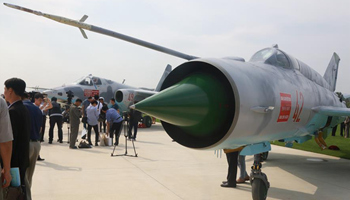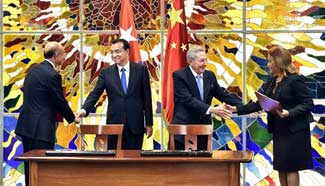FUZHOU, Jiangxi, Sept. 26 (Xinhua) -- Four hundred years ago, when William Shakespeare was writing his sonnets with a quill, Tang Xianzu was recording verses with a brush nearly 6,000 kilometers away.
Four hundred years later, to commemorate these literary giants from east and west, plays by both have been staged together in eastern China's Fuzhou city, Tang's hometown.
"They were in the same contemporary period," said Juliet Short, mayor of Shakespeare's hometown Stratford-upon-Avon. "They are very similar, in different aspects, even though they lived in totally different cultures."
This year marks the 400th anniversary of the death of Shakespeare and Tang. China and Britain have been hosting a series of events to commemorate the anniversaries.
On Saturday, Tang's date of birth, a three-day festival was launched in Jiangxi Province, where people can pay tribute to Tang, open a memorial for him, put on drama performances and hold seminars.
UP AND DOWN IN CHINA
Tang was born in 1550 during the Ming Dynasty (1368-1644), a period where he saw much corruption and restrictions on women. His masterpiece, the "Peony Pavilion," tells of a romance between an official's daughter and a poor scholar, as they pursued love and freedom.
In the 1950s, the local government constructed a building close to Tang's tomb and named it after "Peony Pavilion," but it was destroyed during the Cultural Revolution (1966-76).
Much Chinese culture was under threat at this time, but Tang Tingshui, a 13th generation descendant of the playwright, managed to preserve the book of his family tree by burying it in cattle dung.
The study of Shakespeare in China was almost halted during the same period.
Shakespeare's name first appeared in Chinese books in 1839. Scholar Zhu Shenghao was the first Chinese translator of Shakespeare's 31 plays, before he died in 1944, and the complete works of Shakespeare in Chinese was published in 1978.
Today Shakespeare is arguably the most influential western playwright in China, and an excerpt from "The Merchant of Venice" is used in middle school textbooks today.
GOING GLOBAL
Steve Ansell has his theory about how Shakespeare gained popularity around the world.
"He was English at a time when we had an empire. We ambled around the entire world taking Shakespeare with us. ... Everybody in the world knows William Shakespeare. That's never going to change," said Ansell, artistic director of stage@leeds in the UK.
In comparison, Tang is less known. In China, Tang is ranked as one of the three masters who died in the same year, along with Shakespeare and Spanish writer Cervantes.
"I'm sure many more Chinese students know and probably study Shakespeare than study Tang Xianzu," Ansell said.
Susan Adams, chair of Stratford-upon-Avon Council, said that she hadn't heard of Tang until last year.
Ansell first got to know about Tang two years ago, when he became artistic director of Tang's play "Dreaming under the Southern Bough."
It is a traditional play depicting a man who dreamed of entering an ant kingdom, before marrying a princess and gaining status, and then being expelled.
In Ansell's version, the hero is a western soldier returning from the Iraq war. The main characters wore western costumes.
"We modernized the story," Ansell said. "It is about now, but it's the same story that Tang tells. I hope it is more appealing to the younger generation."
The play premiered in Leeds in July. The response was tremendous and the show was staged eight times at the Edinburgh Festival Fringe, according to Ansell.
"This sort of project will start to open the flood gates," Ansell said. "China and the rest of the world are becoming closer."
Ansell believes that as China's status in the world grows, so does knowledge of its culture, art, cooking and philosophy.
"Great [Chinese] writers and artists will start to spread across the world," Ansell said. "It's great art, but we just don't know about it."
This is a view shared by Zhou Yude, former president of the National Academy of Chinese Theater Art.
"One hundred years ago, such cultural exchange was beyond the imagination," Zhou said.
At that time, China was controlled by warlords, while large areas of Chinese territory were seized by foreign countries as concessions. In spite of its 5,000-year culture, the country lagged behind western countries in economy, military, science and technology.
"In contrast, China is now world's second largest economy, and has dialogue with western countries on an equal footing," Zhou said.
Today, more than 10 versions of "Peony Pavilion" have been performed around the world. "Starting from 1998, the opera 'Peony Pavilion' was put on stage in Vienna, Paris, Rome, London and San Francisco," said Zou Yuanjiang, vice president of Tang Xianzu Studies at the Chinese Opera Society.
NATIONAL CONFIDENCE
Ansell and Leeds University students who starred in the adaption had a rehearsal in Fuzhou, in a park dedicated to commemorating the author, on Saturday. Local people, who have seldom seen westerners in drama, stood to watch, some with babies in their arms, others filming with smart phones.
George Clifford, the lead actor, is a fourth year student in Leeds University. Before the play, he and other performers learned Chinese language and drama techniques.
He told Xinhua that he loved Tang's works. But before doing this project, he found the plays "inaccessible" because of the language.
According to his schoolmate Jonathan Dowsett, language was not the only difficulty.
"In a [U.K.] contemporary theater, people are more used to something avant-garde," Dowsett said. "People can use the audience as part of the performance, while in Chinese theater it is very important to retain the traditional cultural experience."
While he suggests finding a balance to popularize traditional Chinese plays, Ansell said that cultural confidence was necessary.
"Is Tang Xianzu 'China's Shakespeare'? The answer is no," Ansell said. "But it's a very useful connection to make if only to show that it wasn't just Shakespeare who was making great art.
"The key point is that Tang is not Shakespeare. He doesn't need to be. He is the Chinese Tang. That's good enough."
"I think the Chinese need to be proud of the fact that they have Tang."
Britain and China have got a good basis of cultural exchanges, said Susan Adams. "China is opening up. Schools (in UK) now teach Mandarin, and we have lots of exchange visits."
More than 5,000 children in Britain are to learn Chinese as part of a scheme, which allows them to intensively study the language for eight hours per week, according to a recent Daily Mail report.
Zou Zizhen, a professor with the Minjiang University, believed that it is equally, if not more, necessary to popularize the plays domestically.
"If we want to have our culture spread across the globe, we must spread it within China first," he said.
Tang Tingshui, who is also a village doctor, said he had donated all the material he had about Tang Xianzu to the government.
"My fellow villagers and I are not so well educated. It's a bit hard to live up to being descendants of such a great person," he lamented.










